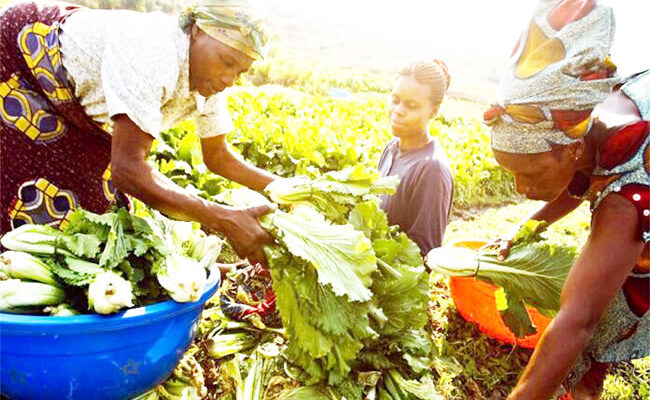

By Collins Nnabuife | Abuja

Agro-Processing, Productivity Enhancement and Livelihood Improvement Support (APPEALS) is a six year World Bank assisted project designed in line with the Agricultural Promotion Policy (APP) of the Federal Government.
The project has a target of reaching 60,000 persons in the six participating states, but from the last review of the project implementation, about 55,864 persons have been assisted in the project.
It is expected that 35 per cent of the beneficiaries of the project will be women and youths who will be empowered along Rice, Cocoa, Poultry, Cashew, Maize, Ginger, Diary, Wheat, Tomato, Cassava and Aquaculture value chains.
The project in being implemented in Enugu, Lagos, Kogi, Kaduna, Kano and Cross River State
The National Coordination Office with the World Bank, the Project Operations Manager of APPEALS project at the National Coordinating Office, Dr Salisu Garba, said the project has reached 55,864 so far.
He said the beneficiaries cut across the individual beneficiaries, like commodity interest groups, the Small and Medium Enterprises, women and youth empowerment.
“So far as at the last mission, we were able to record 55,864 beneficiaries and the target for the programme is 60,000, which is 10,000 per state, you could see we have gone far and before we conclude, we are sure we are going to exceed the 60,000 beneficiaries target”, he stated.
National Project Coordinator, Alhaji Mohammed Sani Jobdi said since the inception of the project and even during the 9th mission which was concluded in November 2022, it has recorded achievements and even surpassed some of the project development objectives of the APPEALS project.
Jobdi said the project had continued to contribute to the national food basket across the different value chains in the year under review
This according to him has come with significant increase in the output of the commodities when compared with the last mission’s said figures.
” For instance, cocoa output increased by 129.01 per cent, while poultry egg, cassava, rice and poultry meat increased by 48.3 per cent, 24.7 per cent, 23.8 per cent, and 7.6 per cent respectively.
The participating States have continued to make progress in the implementation of activities under the various components of the project. The total number of VCIPs being implemented across the States stood at 2,892 which is made up of production VCIPs (75.3%), processing VCIPs (13.6 percent) and marketing VCIPs (11.1 percent).
To significantly reduce the yield gap between farm trials and average national yields, an additional 20 new technologies were demonstrated since the 8th mission to make up the current value of 228 technologies that have so far been demonstrated to 84,736 farmers across the participating states, thus exceeding the endline target of 100 technologies.
Furthermore, the number of farmers adopting improved technologies stood at 33,857 with females constituting about 36.0%. In addition, the project is linking farmers to markets through the facilitation of commercial partnerships resulting in a total of 303 business alliances with 145 off-takers already buying the farmers’ produce across the 11 value chains, with a transaction value worth N23.439 billion.
In terms of livelihood enhancement, the Project has empowered 55,864 direct beneficiaries; with 10,307 women and youth beneficiaries trained and 8,535 Business Investment Plans (BIPs) implemented under the Women and Youth Empowerment Program (WYEP).
The Project has linked 200 agribusiness clusters to infrastructures such as boreholes, tube wells, and box culverts across the participating states. A total of 16 Aggregation and Cottage Processing Centers have been completed while 59 are at varying levels of construction across the participating States to make a total of 90 aggregation centers expected to be built at the end line.
About 13.6km out of the target 80km of rural access roads have been completed while water and energy infrastructure linked to production and processing clusters are at various stages of construction and are to be completed by March 30, 2023.
The project has continued to contribute to the national food basket across the different value chains in the year under review with significant increase in the output of the commodities when compared with the last mission’s figures. For instance, cocoa output increased by 129.01%, while poultry egg, cassava, rice and poultry meat increased by 48.3 percent, 24.7 percent, 23.8 percent, and 7.6 percent respectively.
In Kano State, APPEALS constructed the Balare Farm Access Road measuring 3.2 kilometres to support the Balare wheat and rice cluster, which has reduced the cost of transporting farm produce to the market.
Balare cluster is a group of wheat and rice farmers consisting of 11 Commodity Interest Groups (CIGs)in Ajingi Local Government Area of Kano state.
A number of combined harvesters have been deployed to the field by Kano APPEALS project over the years on a 70-30 per cent purchase arrangement with the project bearing the bulk.
Combined harvester reaps more rice paddy per hectare as against manual labour and provides cleaner paddy.
There are different varieties available based on the planting location and taste. However, the Ofada rice variety is considered a delicacy and it is consumed by the teeming population of Lagos state.
To address some of the challenges facing the production of Ofada rice, the logos APPEALS project in collaboration with AfricaRice and International Institute for Tropical Agriculture (IITA) developed a pure strain of Ofada rice seed.
This move is to forestall the planting of adulterated seed which could eventually result in bad harvest. The project further trained and exposed processors to contemporary technologies in processing rice and also supported them with equipment.
ALSO READ FROM NIGERIAN TRIBUNE








